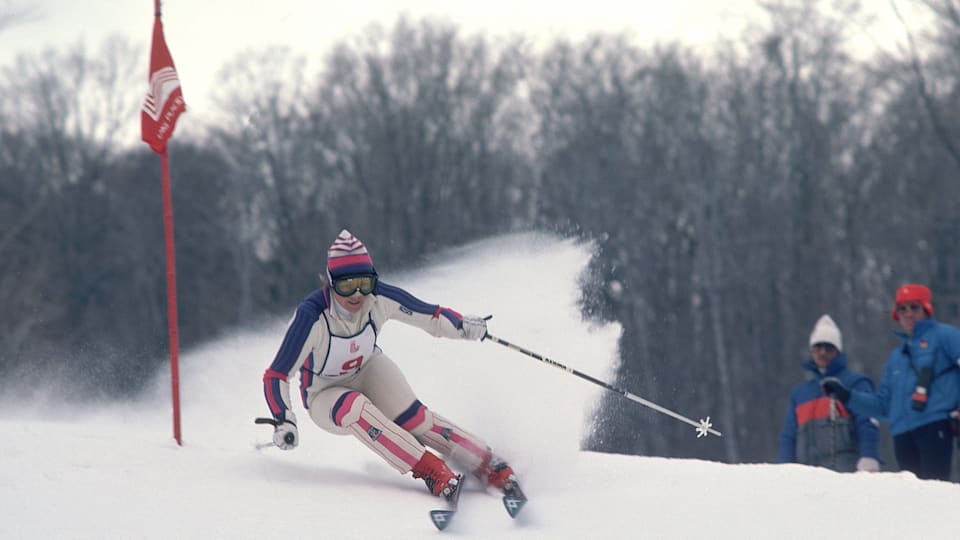Look to the past: The smallest nation to produce an Olympic champion
Of all the countries to have competed at the Olympic Games, Liechtenstein is the smallest nation - in terms of population - to have produced an Olympic champion. Hanni Wenzel was the hero of the day, winning gold in Alpine skiing at Lake Placid 1980. Olympics.com brings you the lowdown on this glorious moment for the small principality at the heart of Europe.

Athletes from over 200 countries have taken part in the Olympic Games. Some of the nations are very populous, while others are not. Some cover wide geographical areas, while others may be smaller than the town or city in which many of you live. These are known as micro-states.
At this year's Summer Olympic Games in Tokyo, two of these countries garnered a lot of attention: Bermuda and San Marino.
Bermuda is just over 53 kilometres in size and has a population of 65,000 people. Tokyo 2020 was the first time an athlete from the nation won a gold medal, with Flora Duffy triumphing in the women’s triathlon competition. Prior to that, her compatriot Clarence Hill won a bronze medal in heavyweight boxing at Montreal 1976.
San Marino also tasted glory at Tokyo 2020, becoming the smallest nation to produce an Olympic medallist at the Summer Games. Surrounded by Italy, San Marino has a population of just under 35,000 people, and athletes from the nation won silver and bronze in the mixed trap and women’s trap shooting competitions respectively, as well as a bronze medal in wrestling.
However, among all of these micro-states, the least populous to have produced an Olympic champion is Liechtenstein, after Hanni Wenzel won the Alpine skiing title at Lake Placid 1980.
Here is the story of Lichtenstein’s golden moment at the Olympic Winter Games.
Career
Born in the then-Federal Republic of Germany, Wenzel moved with her family to Liechtenstein - a country with less than 40,000 inhabitants that can be traversed by car in under 30 minutes - when she was only a year old. From an early age, she shared a passion for Alpine skiing with her younger brothers, Andreas and Petra.
After a strong performance at the 1974 World Championships in St. Moritz, where she won the gold medal in slalom (the youngest athlete ever to win the title at the time) and a silver in the combined, Wenzel obtained citizenship from Liechtenstein. She was, therefore, eligible to represent the Principality at Innsbruck 1976, where she won a bronze medal in Alpine skiing. Two years later in 1978, she became the overall winner of the World Cup.
Her best season
After her excellent results in previous seasons, Wenzel was the odds-on favourite to win the Alpine skiing competition at the Olympic Winter Games Lake Placid 1980. In her first event, downhill, she won the silver medal. Four days later, in the giant slalom, she won gold and made history, as Liechtenstein became the smallest nation in history to produce an Olympic champion.
"It was the biggest success of my career," Wenzel told Olympics.com.
The feat would be repeated 48 hours later, in the last Alpine skiing event of those Games, the slalom. Wenzel won a second gold to double the nation’s medal count. Her success not only led to many people searching for the tiny nation on a map but also caused some confusion among members of the audience at the Games, as Liechtenstein’s anthem is identical to that of “God Save the Queen”, best known around the world as the anthem of Great Britain.
"It was quite an experience for Liechtenstein to have won so many medals at those Games organised in the United States," Wenzel commented during the 2009 Fair Play Awards.
The Wenzel family
Liechtenstein's 10 Olympic medals (almost one for every 3,800 people in the country) have all been won at the OIympic Winter Games. Seven of them have been won by members of the Wenzel family. In addition to Hanni, Andreas was also a silver medallist at Lake Placid 1980 and won bronze at Sarajevo 1984, both in the giant slalom.
Hanni married Harti Weirather - an Austrian skier who won the overall downhill World Cup title in 1981 - with whom she had a daughter, Tina Weirather. At PyeongChang 2018, Tina won the nation’s tenth Olympic medal - the seventh in the family - with bronze in the Alpine skiing Super-G.
The other three medals won by athletes from Liechtenstein, other than those won by the Wenzels, came from the brothers Willy and Paul Frommelt (both slalom bronze medallists at Innsbruck 1976 and Calgary 1988, respectively); and Ursula Konzett, who also slalom bronze at Sarajevo 1984.
About Hanni Wenzel
After Lake Placid 1980, Hanni Wenzel's career spanned another four years. In 1984 she retired, having won four Olympic medals (including two golds), four world titles and 33 World Cup stage victories.
Her record leaves no doubt that she is one of the greatest athletes in her sport’s history. She is also, without a doubt, one of the biggest sporting names to have ever emerged from her country.
